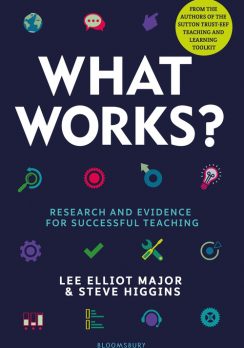Publisher
Bloomsbury
ISBN 10
1472965639
Published
3 Oct 2019
I had Gert Biesta’s seminal Why ‘What Works’ Won’t Work ringing in my ears as I picked up Major and Higgins’s What Works?, so it was with a sigh of relief that I noticed the question mark at the end of the title.
That punctuation is important, as the authors emphasise in the introduction. “What works?” they say, “is a deceptively simple question.” They go on to make a good case in this well-written introduction that “[d]istilling research findings into actionable steps is tricky work”. It certainly is, so it was with a sense of excitement that I settled down to read.
They have set themselves an admirable and challenging task. Sadly, at the end of the book I was left with the feeling that they have fallen short of achieving it.
There is no doubt that its breadth is ambitious, covering an impressive 21 chapters from topics such as phonics to “art for art’s sake” – but it is beyond me how a topic as fundamental to teaching as behaviour has been left out. This book is a bantamweight, coming in at less than 150 pages and unfortunately depth has quite clearly been sacrificed for breadth.
Both authors have an impressive pedigree and are surely far from short of things to say, so if the book’s brevity is an editorial decision, it is a poor one.
If the book’s brevity is an editorial decision, it is a poor one
David Mitchell’s What Really Works in Special and Inclusive Education is a good example of where the balance is well struck with this kind of book. By contrast, quite a few of the chapters here are only four or five pages long, and it was rare for me to feel that I was any further forward in my thinking at the end.
To be fair, the authors do squeeze a lot into those small chapters, but nothing really gets any further than a brief mention. The referencing is interestingly split into, as the authors call them, academic and practical so that the reader can pursue their interest relatively easily if they want. I would certainly have to if I wanted to give any of these topics any real consideration in my school.
The authors are careful to support the reader with the interpretation of the evidence in the useful section on technical notes. They advise that they “use averages of averages, with all of the mathematical risks involved” and invite the reader to give due consideration to our own contexts and our skills and abilities as teachers.
However, I found the use of “months’ progress” as a measure of effectiveness – the estimate of impact retained from their Sutton Trust-EEF Teaching and Learning Toolkit – a wholly unconvincing device. In fact, I feel it gets in the way in the same manner that Black and Wiliam (ironically quoted in this book) argue that grades can inhibit effective feedback.
The first words of the first chapter, Improving Classroom Teaching, are “Attainment gain: +4 months”. I feel that this reductive presentation dilutes out of all practical use the complex and nuanced evidence of impact on the very broad topics covered.
On the whole, the structure of the chapters was helpful and I particularly liked the Unexpected finding sections which made me look at some topics from a fresh angle.
The authors are right that school leaders and teachers need to be more discerning and critical of the latest fads, and this book could have made a solid contribution in helping them to do that. Sadly, the brevity and overly-simplistic presentation of estimations of impact means that contribution will not be as great as it could have been.













Your thoughts